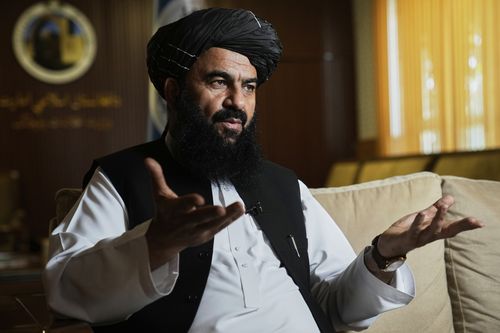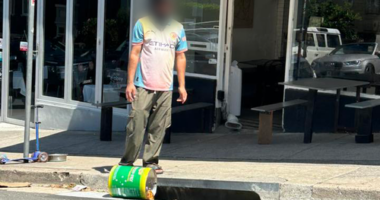Share this @internewscast.com
âThe Afghan people are warm and welcoming and wish to host tourists from other countries and engage with them,â Deputy Minister of Tourism Qudratullah Jamal told The Associated Press in an early June interview.
âTourism brings many benefits to a country. We have considered those benefits and aim for our nation to take full advantage of them.â

A potentially lucrative industry
Tourism is a vital, multi-billion-dollar industry for many countries.
Afghanistanâs isolation on the international stage, largely because of the Talibanâs restrictions on women and girls, has left much of its 41 million people mired in poverty.
As it struggles to attract foreign investment, the lucrative potential of tourism is far from lost on the government.
âWe are currently earning a considerable amount of revenue from this industry, and we are hopeful it will grow even more in the future,â Jamal said, noting money spent by visitors can reach more layers of society than revenue from other industries.
âWe are optimistic this sector will evolve into a large economy, bringing significant benefits. It plays an important role in strengthening our national economy.â
Trickle rather than a flood
Tourist visas are quick and easy to obtain and flights from major transit hubs such as Dubai and Istanbul operate several times a week.
The government has even set up a training institute for men â and it is only for men â seeking jobs in the hospitality and tourism sector.
While visitor numbers are still very much a trickle rather than a flood, they are increasing.
Nearly 9000 foreign tourists visited Afghanistan last year, while nearly 3,000 people visited in the first three months of this year, Jamal said.
Four decades of near-continuous conflict kept nearly all vacationers away from this landlocked country of towering mountains, deep gorges and millennia of history.

The Talibanâs takeover from a US-backed government in August 2021 stunned the world and sent thousands of Afghans fleeing.
But with the insurgency over, the bloodshed from frequent bombings and suicide attacks all but ended too.
Attacks still occur, however.
An Islamic State affiliate in Afghanistan remains active and gunmen killed six people, including three Spanish tourists, in a May 2024 attack in Bamiyan, one of the countryâs main tourist attractions, where centuries-old giant Buddhas carved into the cliffs were blown up by the Taliban in 2001.

While Western countries still advise against travel to Afghanistan, a drop in violence from the two decades of US-led military presence is indisputable, as the government is keen to point out.
âAfghanistan has gone through many years of war and hardship. Now, we want tourists to come and see the true traditions and customs of Afghans, to understand Afghan life, creativity and resilience,â Jamal said, noting there was âcomprehensive security across Afghanistan”.
Critics question the ethics of foreigners visiting Afghanistan for pleasure when its government discriminates so heavily against half the countryâs population.
Education beyond primary school level is banned for girls and women and few professions are open to them. Women cannot enter parks, gardens or gyms.
Beauty salons are forbidden.
Authorities dictate how women dress and have demanded they cover their faces in public, a decree still flouted by many, particularly in Kabul.
Some visitors say they contemplated the ethics, but ultimately wanted to see the situation for themselves.

French-Peruvian Illary Gomez said she and her British partner, James Liddiard, debated for about a year whether to drive through Afghanistan as part of their UK-to-Japan camper van journey.
âSome things didnât feel morally right,â she said.
But once here, they said they found a warm, hospitable and welcoming people and beautiful landscapes.
They didnât feel their presence was any form of support for the Taliban.
By travelling, âyou put money in the hands of the people, not the government,â Liddiard said.
The treatment of women is particularly sensitive for government officials.
Jamal declined to comment on the subject beyond saying male and female visitors were welcome.
âThose who respect our laws and traditions have already come and can continue to come,â he said.
While most restrictions are strictly enforced on Afghan women, they are far more relaxed for foreigners.
Although they must still wear a headscarf in public, foreign women are more likely to gain entry into some restricted areas such as parks and are rarely asked to cover their faces in public.
Opening the country to foreign visitors was also a way of building bridges, Jamal said.
âIt is a great way to promote interaction between the people of different countries. It helps build international relations and is also beneficial for trade,â he told the AP.
âWhen foreigners come here, Afghans also learn a lot from them. In addition to expanding commerce, tourism also helps foster mutual understanding, cultural exchange and strengthens talents as people learn from one another.â
A foreign traveller seeing the country with his own eyes âcreates closeness, builds connections and fosters trust among people,â Jamal said.
âThey will respect each otherâs culture and the distance between peoples will diminish.
âSo this is not just economic development; it also brings spiritual and political benefits,â he said.











